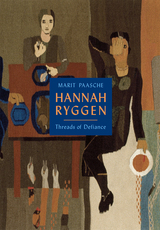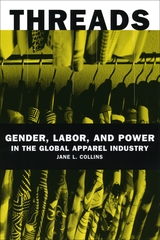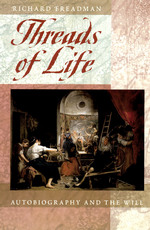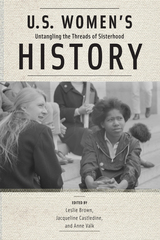5 books about Threads

Hannah Ryggen
Threads of Defiance
Marit Paasche
University of Chicago Press, 2019
Hannah Ryggen (1894–1970) was a Swedish-Norwegian modern artist who began her career as a painter before switching to creating political art in the form of monumental tapestries. Combining the decorative and the political, Ryggen was ahead of her time with her turn to “political weaving.” She was also a feminist with strong communist sympathies involved in the international workers’ movement. Her dramatic, beautiful tapestries were shown at both the Paris and Brussels World’s Fairs, but she was largely forgotten by the international art world in the decades after her death. In recent years, however, as interest in both fiber arts and pioneering women artists has grown, Ryggen’s work has returned to the public eye, with major international exhibitions and fresh attention from curators, collectors, and critics.
A widely recognized authority on Ryggen, Marit Paasche brings this important Scandinavian artist to the foreground in this biography, the first published on Ryggen in English. Paasche looks at Ryggen within the social, political, and cultural contexts of her time and explores how these issues informed her work, from her anti-fascist tapestry that depicted a spear piercing Mussolini’s head to one protesting the war in Vietnam. Published to correspond with a major retrospective in Frankfurt, of which Paasche is one of the curators, Hannah Ryggen is a foundational book that will provide a crucial introduction of this artist to a broader audience.
A widely recognized authority on Ryggen, Marit Paasche brings this important Scandinavian artist to the foreground in this biography, the first published on Ryggen in English. Paasche looks at Ryggen within the social, political, and cultural contexts of her time and explores how these issues informed her work, from her anti-fascist tapestry that depicted a spear piercing Mussolini’s head to one protesting the war in Vietnam. Published to correspond with a major retrospective in Frankfurt, of which Paasche is one of the curators, Hannah Ryggen is a foundational book that will provide a crucial introduction of this artist to a broader audience.
[more]

Threads
Gender, Labor, and Power in the Global Apparel Industry
Jane L. Collins
University of Chicago Press, 2003
Americans have been shocked by media reports of the dismal working conditions in factories that make clothing for U.S. companies. But while well intentioned, many of these reports about child labor and sweatshop practices rely on stereotypes of how Third World factories operate, ignoring the complex economic dynamics driving the global apparel industry.
To dispel these misunderstandings, Jane L. Collins visited two very different apparel firms and their factories in the United States and Mexico. Moving from corporate headquarters to factory floors, her study traces the diverse ties that link First and Third World workers and managers, producers and consumers. Collins examines how the transnational economics of the apparel industry allow firms to relocate or subcontract their work anywhere in the world, making it much harder for garment workers in the United States or any other country to demand fair pay and humane working conditions.
Putting a human face on globalization, Threads shows not only how international trade affects local communities but also how workers can organize in this new environment to more effectively demand better treatment from their distant corporate employers.
To dispel these misunderstandings, Jane L. Collins visited two very different apparel firms and their factories in the United States and Mexico. Moving from corporate headquarters to factory floors, her study traces the diverse ties that link First and Third World workers and managers, producers and consumers. Collins examines how the transnational economics of the apparel industry allow firms to relocate or subcontract their work anywhere in the world, making it much harder for garment workers in the United States or any other country to demand fair pay and humane working conditions.
Putting a human face on globalization, Threads shows not only how international trade affects local communities but also how workers can organize in this new environment to more effectively demand better treatment from their distant corporate employers.
[more]

Threads of Life
Autobiography and the Will
Richard Freadman
University of Chicago Press, 2001
Many autobiographers share profound questions about human life with their readers—questions like: To what extent was my life imposed on me? To what extent did I bring it about through particular choices and actions, through the activity of my own will? Indeed, the issue of the will is central to autobiographical writing, and some of the greatest autobiographies give extended consideration to the will—its nature; its powers; its limitations; the forms of freedom, constraint, and expression it finds in various cultures; its role in particular human lives.
In this new study, unprecedented in subject and scope, Richard Freadman offers the first sustained account of how changing theological, philosophical, and psychological accounts of the human will have been reflected in the writing of autobiography, and of how autobiography in its turn has helped shape various understandings of the will. Early chapters trace narrative representations of the will from antiquity (the Greeks and Augustine) to postmodernism (Derrida and Barthes), with particular emphasis on late modernity's culture of the will. Later chapters then present detailed and powerfully original readings of autobiographical texts by Louis Althusser, Roland Barthes, B. F. Skinner, Ernest Hemingway, Simone de Beauvoir, Arthur Koestler, Stephen Spender, and Diana Trilling.
Freadman's interdisciplinary approach to autobiography and the will includes a theoretical defense of the view that autobiographers are, in varying degrees, agents in their own texts. Threads of Life argues that late modernity has inherited deeply conflicted attitudes to the will. Freadman suggests that these attitudes, now deeply embedded in contemporary cultural discourse, need reexamining. In this, he contends, 'reflective autobiography' has an important part to play.
In this new study, unprecedented in subject and scope, Richard Freadman offers the first sustained account of how changing theological, philosophical, and psychological accounts of the human will have been reflected in the writing of autobiography, and of how autobiography in its turn has helped shape various understandings of the will. Early chapters trace narrative representations of the will from antiquity (the Greeks and Augustine) to postmodernism (Derrida and Barthes), with particular emphasis on late modernity's culture of the will. Later chapters then present detailed and powerfully original readings of autobiographical texts by Louis Althusser, Roland Barthes, B. F. Skinner, Ernest Hemingway, Simone de Beauvoir, Arthur Koestler, Stephen Spender, and Diana Trilling.
Freadman's interdisciplinary approach to autobiography and the will includes a theoretical defense of the view that autobiographers are, in varying degrees, agents in their own texts. Threads of Life argues that late modernity has inherited deeply conflicted attitudes to the will. Freadman suggests that these attitudes, now deeply embedded in contemporary cultural discourse, need reexamining. In this, he contends, 'reflective autobiography' has an important part to play.
[more]

U.S. Women's History
Untangling the Threads of Sisterhood
Brown, Leslie
Rutgers University Press, 2017
In the 1970s, feminist slogans proclaimed “Sisterhood is powerful,” and women’s historians searched through the historical archives to recover stories of solidarity and sisterhood. However, as feminist scholars have started taking a more intersectional approach—acknowledging that no woman is simply defined by her gender and that affiliations like race, class, and sexual identity are often equally powerful—women’s historians have begun to offer more varied and nuanced narratives.
The ten original essays in U.S. Women's History represent a cross-section of current research in the field. Including work from both emerging and established scholars, this collection employs innovative approaches to study both the causes that have united American women and the conflicts that have divided them. Some essays uncover little-known aspects of women’s history, while others offer a fresh take on familiar events and figures, from Rosa Parks to Take Back the Night marches.
Spanning the antebellum era to the present day, these essays vividly convey the long histories and ongoing relevance of topics ranging from women’s immigration to incarceration, from acts of cross-dressing to the activism of feminist mothers. This volume thus not only untangles the threads of the sisterhood mythos, it weaves them into a multi-textured and multi-hued tapestry that reflects the breadth and diversity of U.S. women’s history.
[more]

Weaving the Threads of Life
The Khita Gyn-Eco-Logical Healing Cult among the Yaka
René Devisch
University of Chicago Press, 1993
For the Yaka of Southwestern Zaire, infertility is a tear in the fabric of life, and the Khita fertility ritual is a trusted way of reweaving the damaged strands. In Weaving the Threads of Life Rene Devisch offers an extended analysis of the Khita cult, which leads to an original account of the workings of ritual healing.
Drawing on many years among urban and rural Yaka, Devisch analyzes their understanding of existence as a fabric of firmly but delicately interwoven threads of nature, body, and society. The fertility healing ritual calls forth forces, feelings, and meanings that allow women to rejoin themselves to the complex pattern of social and cosmic life. These elaborate rites—whether simulating mortal agony and rebirth, gestation and delivery, or flowering and decay; using music and dance, steambath or massage, dream messages or scarification—are not based on symbols of traditional beliefs. Rather, Devisch shows, the rites themselves generate forces and meaning, creating and shaping the cosmic, physical, and social world of their participants.
In contrast to current theoretical methods such as postmodern or symbolical interpretation, Devisch's praxiological approach is unique in also using phenomenological insights into the intent and results of anthropological fieldwork. This innovative work will have ramifications beyond African studies, reaching into the anthropology of medicine and the body, comparative religious history, and women's studies.
Drawing on many years among urban and rural Yaka, Devisch analyzes their understanding of existence as a fabric of firmly but delicately interwoven threads of nature, body, and society. The fertility healing ritual calls forth forces, feelings, and meanings that allow women to rejoin themselves to the complex pattern of social and cosmic life. These elaborate rites—whether simulating mortal agony and rebirth, gestation and delivery, or flowering and decay; using music and dance, steambath or massage, dream messages or scarification—are not based on symbols of traditional beliefs. Rather, Devisch shows, the rites themselves generate forces and meaning, creating and shaping the cosmic, physical, and social world of their participants.
In contrast to current theoretical methods such as postmodern or symbolical interpretation, Devisch's praxiological approach is unique in also using phenomenological insights into the intent and results of anthropological fieldwork. This innovative work will have ramifications beyond African studies, reaching into the anthropology of medicine and the body, comparative religious history, and women's studies.
[more]
READERS
Browse our collection.
PUBLISHERS
See BiblioVault's publisher services.
STUDENT SERVICES
Files for college accessibility offices.
UChicago Accessibility Resources
home | accessibility | search | about | contact us
BiblioVault ® 2001 - 2024
The University of Chicago Press









